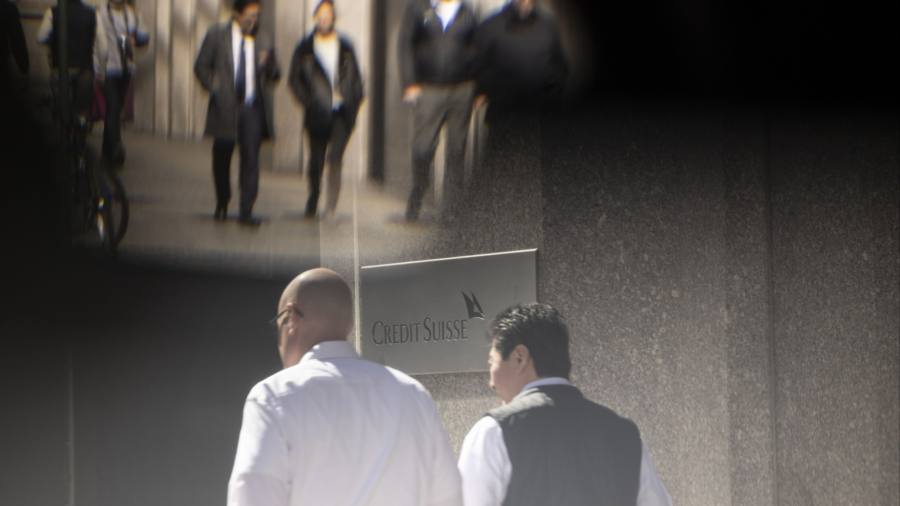UBS is to impose tight restrictions on Credit Suisse bankers including a ban on new clients from high-risk countries and on complex financial products as it prepares to take over its ailing rival as early as Monday.
UBS executives have drawn up a list of nearly two dozen “red lines” that prohibit Credit Suisse staff from a range of activities from the first day the two banks are combined, according to people with knowledge of the measures.
Prohibited activities include taking on clients from countries such as Libya, Russia, Sudan and Venezuela and launching new products without approval from UBS managers.
Ukrainian politicians and state-owned enterprises will also be blocked to prevent potential money laundering
“We are worried about ‘cultural contamination’,” UBS chair Colm Kelleher said last month over taking on Credit Suisse staff. “We are going to have an incredibly high bar for who we bring into UBS.”
The prohibitions, written by UBS’s compliance department, are designed to reduce the risk of the transaction, which was orchestrated by Swiss authorities three months ago to save Credit Suisse from collapse.
UBS executives fear they are taking on a bank that has traditionally been much more willing to accept risky clients and offer them high-stakes products. Credit Suisse’s final few years as an independent company were marked by a series of scandals and crises, which one internal report said were a result of its “lackadaisical attitude towards risk”.
UBS finalised an agreement with the Swiss government on Wednesday that will provide the bank with up to SFr9bn ($10bn) to protect it from losses on the rescue. The government assistance would kick in after UBS covered the first SFr5bn of losses.
The loss protection agreement was the final hurdle for UBS to cross before completing the takeover.
The list of restrictions — which UBS executives have named “red lines” — cover 11 financial risks and 12 non-financial risks.
While many of the risks are operational — concerning issues such as the distribution of research and use of offices — other decrees affect areas of Credit Suisse’s business more directly.
Under the rules, Credit Suisse bankers are unable to trade in a range of arcane financial products, including Korean derivatives and options of certain quantitative indices.
In 2006, Credit Suisse lost $120mn on Korean derivatives, leading to a shake-up of the unit’s management team. But the bank has continued to operate in the market.
Credit Suisse employees must also ask UBS executives for permission to extend loans backed by assets such as yachts, ships and real estate of more than $60mn.
As banker to some of the world’s richest people, Credit Suisse has long provided loans to fund billionaires’ private jet purchases, while it has also engaged in yacht finance.
Last year Credit Suisse asked hedge funds and other investors to destroy documents relating to its richest clients’ yachts and private jets following revelations in the Financial Times of a securitisation deal involving loans it made to oligarchs who were later sanctioned.
Staff at Credit Suisse’s Swiss bank must ask permission from UBS to extend loans to borrowers outside the country and for foreign property.
In order to limit the risk of money laundering, bribery and corruption, Credit Suisse bankers are also barred from bringing on new clients from a range of high-risk countries. These include Afghanistan, Albania, Belarus, Burkina Faso, Democratic Republic of Congo, El Salvador, Eritrea, Ethiopia, Guinea, Haiti, Iraq, Kosovo, Kyrgyzstan, Libya, Moldova, Myanmar, Nicaragua, Palestine, Russia, South Sudan, Sri Lanka, Sudan, Tajikistan, Turkmenistan, Uzbekistan, Venezuela, Yemen and Zimbabwe.
Credit Suisse staff were sent a company-wide memo on Thursday, telling them to expect new “red lines” on the day the deal closed, though the details of the rules was not included.
UBS and Credit Suisse declined to comment on the rules.
Separately, Swiss parliamentarians on Thursday voted to empower a special parliamentary commission of inquiry into the downfall of Credit Suisse.
Read the full article here




